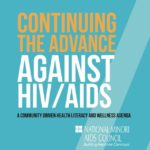 Outlines community driven agenda to promote health and wellness through literacy
Outlines community driven agenda to promote health and wellness through literacy
Washington, DC – To mark World AIDS Day, the National Minority AIDS Council (NMAC) is pound to announce the release of its new report, Continuing the Advance against HIV/AIDS: A Community Driven Health Literacy and Wellness Agenda. The document, which was developed in large part through the discussions that occurred during its two-day Health Literacy and Treatment Education Think Tank held last year, as well as the work groups that were subsequently formed with Think Tank participants.
NMAC Director of Treatment Education, Adherence & Mobilization Moises Agosto said, “I am pleased to present this new report and offer it as one possible path forward to ensuring that those who are most vulnerable to HIV, have the knowledge and tools necessary to advocate for their own quality health care. In the mid-90s therapies were introduces that required significant education around adherence and side-effects. The patient and provider both received support to ensure successful outcomes, and to our movement’s credit, most of this education and the infrastructure to provide it were developed and provided by the HIV community itself.”
“As we move forward, and especially as we mark World AIDS Day, it is critical that we redefine HIV treatment education,” added Agosto. “We must work together to develop a larger framework that can be used to address the health and insurance literacy needs of those living with and vulnerable to HIV, as well as issues related to overall wellness and the impact of social determinant on health outcomes. This will also require a policy and advocacy agenda in order to ensure adequate funding to assist those who may require these services, especially as they navigate the new health care infrastructure. It’s imperative that we empower individuals to actively engage in their own care so that they can feel truly invested in their own wellbeing.”
The Agenda released today provides a rationale and recommendations to support stakeholders in recognizing and promoting strong evidence-based health literacy programming among people living with HIV, viewing it as an essential component to and strategy for ending the HIV epidemic. The recommendations made herein are the result of significant community consultation, a review of the available literature and the previously mentioned Think Tank and additional targeted expert consultation.
###